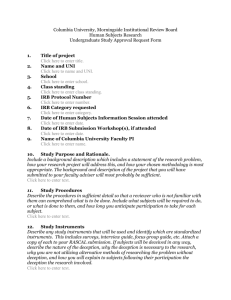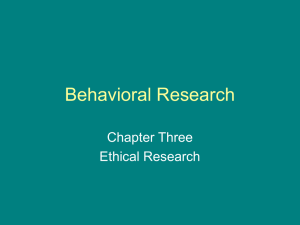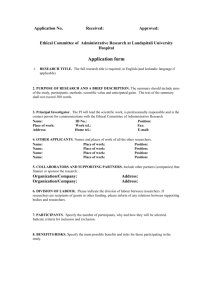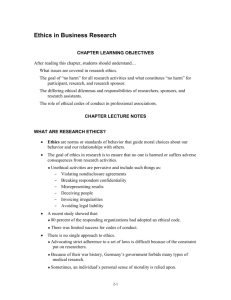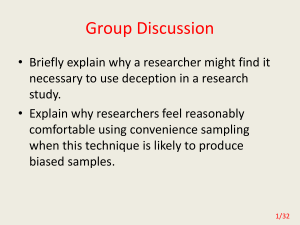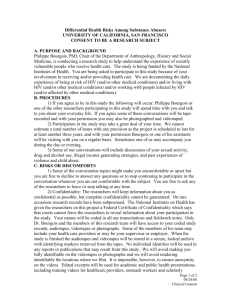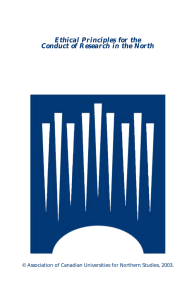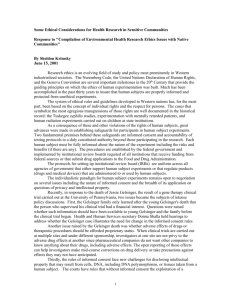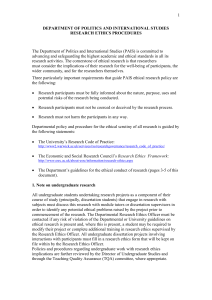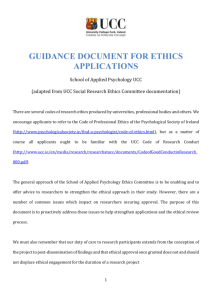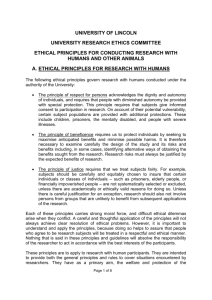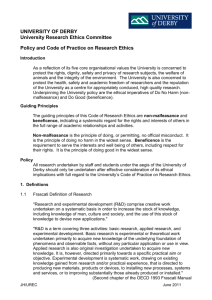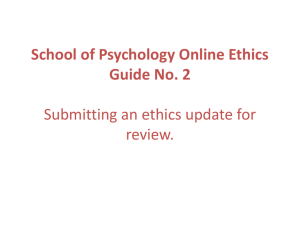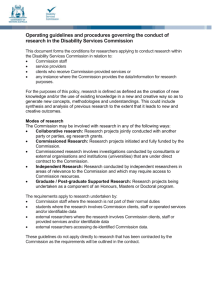ethical guidelines for conducting experiments
advertisement
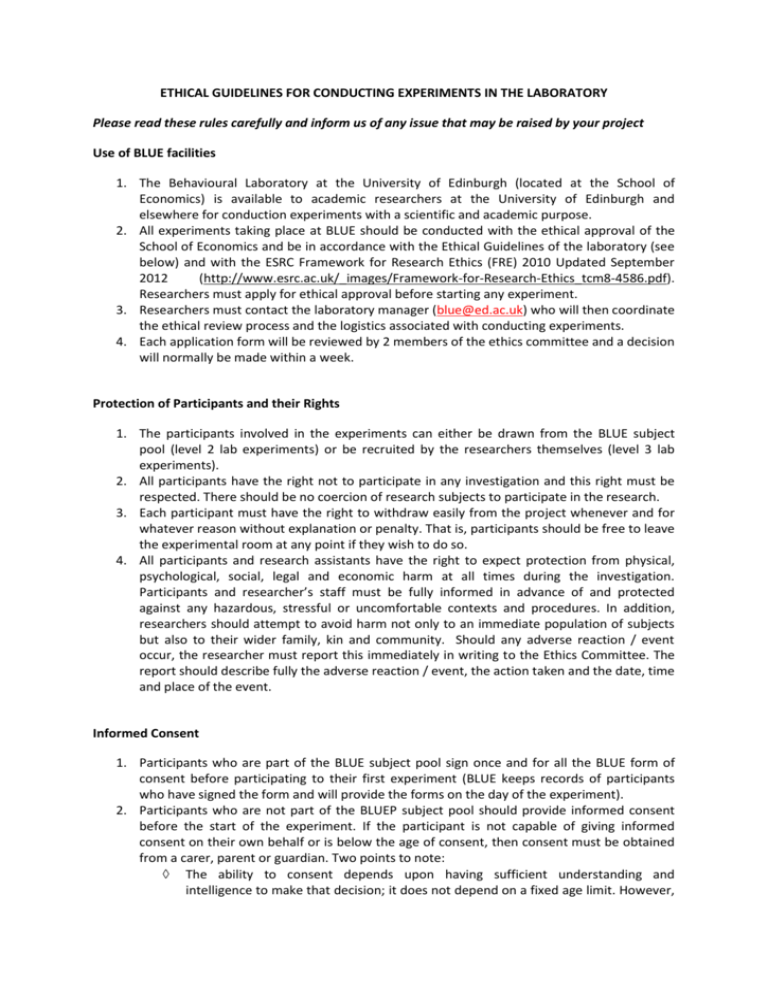
ETHICAL GUIDELINES FOR CONDUCTING EXPERIMENTS IN THE LABORATORY Please read these rules carefully and inform us of any issue that may be raised by your project Use of BLUE facilities 1. The Behavioural Laboratory at the University of Edinburgh (located at the School of Economics) is available to academic researchers at the University of Edinburgh and elsewhere for conduction experiments with a scientific and academic purpose. 2. All experiments taking place at BLUE should be conducted with the ethical approval of the School of Economics and be in accordance with the Ethical Guidelines of the laboratory (see below) and with the ESRC Framework for Research Ethics (FRE) 2010 Updated September 2012 (http://www.esrc.ac.uk/_images/Framework-for-Research-Ethics_tcm8-4586.pdf). Researchers must apply for ethical approval before starting any experiment. 3. Researchers must contact the laboratory manager (blue@ed.ac.uk) who will then coordinate the ethical review process and the logistics associated with conducting experiments. 4. Each application form will be reviewed by 2 members of the ethics committee and a decision will normally be made within a week. Protection of Participants and their Rights 1. The participants involved in the experiments can either be drawn from the BLUE subject pool (level 2 lab experiments) or be recruited by the researchers themselves (level 3 lab experiments). 2. All participants have the right not to participate in any investigation and this right must be respected. There should be no coercion of research subjects to participate in the research. 3. Each participant must have the right to withdraw easily from the project whenever and for whatever reason without explanation or penalty. That is, participants should be free to leave the experimental room at any point if they wish to do so. 4. All participants and research assistants have the right to expect protection from physical, psychological, social, legal and economic harm at all times during the investigation. Participants and researcher’s staff must be fully informed in advance of and protected against any hazardous, stressful or uncomfortable contexts and procedures. In addition, researchers should attempt to avoid harm not only to an immediate population of subjects but also to their wider family, kin and community. Should any adverse reaction / event occur, the researcher must report this immediately in writing to the Ethics Committee. The report should describe fully the adverse reaction / event, the action taken and the date, time and place of the event. Informed Consent 1. Participants who are part of the BLUE subject pool sign once and for all the BLUE form of consent before participating to their first experiment (BLUE keeps records of participants who have signed the form and will provide the forms on the day of the experiment). 2. Participants who are not part of the BLUEP subject pool should provide informed consent before the start of the experiment. If the participant is not capable of giving informed consent on their own behalf or is below the age of consent, then consent must be obtained from a carer, parent or guardian. Two points to note: The ability to consent depends upon having sufficient understanding and intelligence to make that decision; it does not depend on a fixed age limit. However, even when a child under 16 years of age is judged able to consent, approval from a carer, parent or guardian must be sought, and it may also be useful to consider seeking it for older children. In the case of incompetent adults, the law in the United Kingdom does not recognise proxy consent by a relative. However, the views of a relative and / or a carer should be sought. In addition, the assent of the incompetent person him/herself should be sought. 3. It should be remembered that research staff are also participants and need to be made fully aware of the proposed research and its potential risks to them. Prohibition of deception Under no circumstances should subjects be lied to or deceived in any way. The laboratory is very concerned about developing and maintaining a reputation among the student population for honesty. This rule of no deception applies to the recruitment process, the instructions provided during the experimental sessions, and the economic compensation subjects receive for taking part in the experiment. Experiments that involve deception and then later truth-telling (i.e. debriefing) are also proscribed. Recruitment of and Payments to Participants 1. Recruitment of subjects should occur through the BLUE recruitment website. If researchers wish to use alternative recruitment procedures, they should seek the approval of the BLUE Ethics Committee. 2. Incentives, additional payments and rewards paid to participants require approval by the Ethics Committee. Unless convincing methodological reasons on the contrary are provided, experimental subjects should get on average an economic incentive that motivate them to take part in the experimental sessions. The average payment should be between £10 and £15 per hour. In case of a flat fee, subjects should expect to get at least £5 per half an hour spent in the lab (on top of the show-up fee). In case the experiment must be ended unexpectedly (for example because of a technical failure), participants must be compensated for their participation at a rate of £10/hour. 3. The anonymity of participants should be guaranteed in the payment procedure. Subjects will be assigned a number and BLUE will provide envelopes with a corresponding number for all participants. The researcher may choose how to distribute the envelopes to participants: Either by taking apart subjects one by one or by distributing them in the experimental room at the end of the experimental session. In no circumstances should the participants be informed of each other’s payment. 4. In the event that we are responsible for a mistake that is to the disadvantage of participants, we will inform and compensate the respective participants. Data storage and privacy policy 1. All participants have the right to expect that the information supplied by them will be treated as confidential and will be protected as such. 2. All participants have the right to expect that their identity will be protected. 3. Researchers should ensure that data is stored in an appropriate way, protecting the confidentiality and anonymity of participants. 4. Researchers should be aware of requirements with respect to personal data laid down in the Data Protection Act 1998. More information can be found on this link: http://www.opsi.gov.uk/Acts/Acts1998/ukpga_19980029_en_1 5. The data collected in the experiments should only be used for scientific purposes. 6. No link will be established between the personal data in the participants’ database and the data collected during a study.
![Informed Consent Form [INSERT YOUR DEGREE]](http://s3.studylib.net/store/data/007051752_2-17c4425bfcffd12fe3694db9b0a19088-300x300.png)


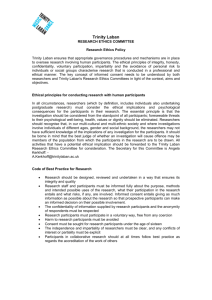
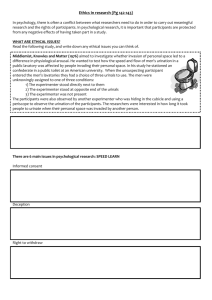
![Janet Boddy, Reader in Child, Youth and Family Studies, School of Education and Social Work [slides only]](http://s2.studylib.net/store/data/015029329_1-c4db5e91e79f69d3024b8f848185d0ef-300x300.png)

